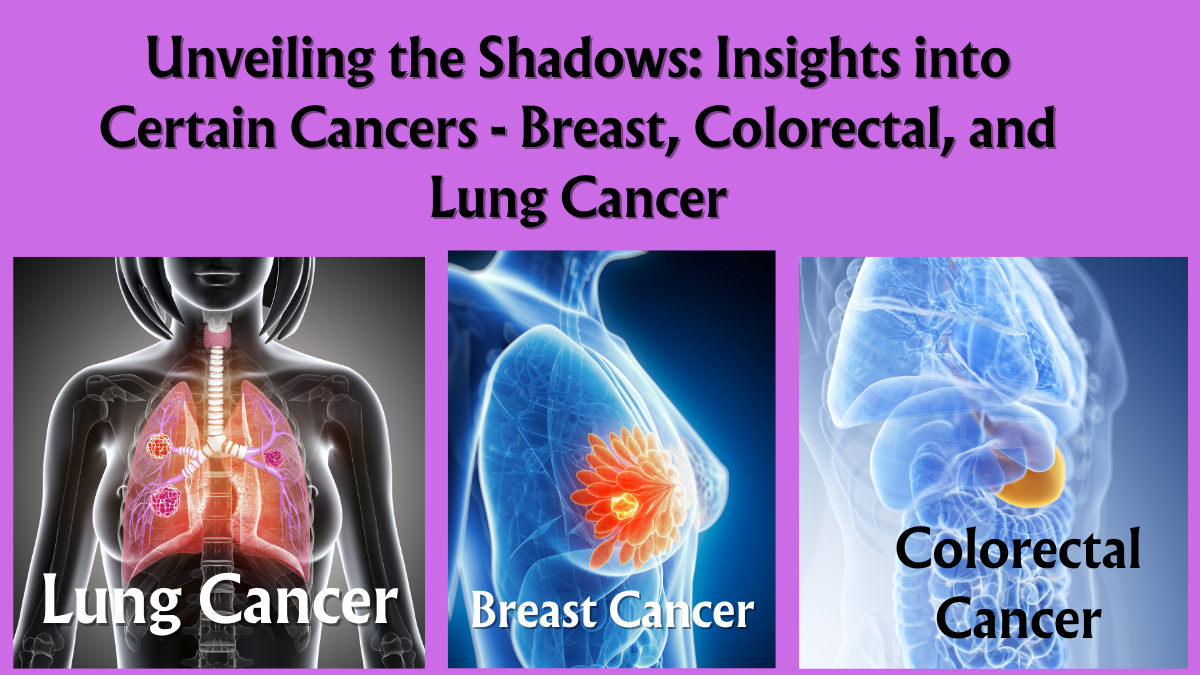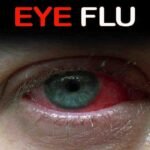Unveiling the Shadows: Insights into Certain Cancers – Breast, Colorectal, and Lung Cancer
Certain cancers have a profound impact on individuals and communities, necessitating a comprehensive understanding of effective prevention, early detection, and management. Let’s delve into the intricacies of Breast Cancer, Colorectal Cancer, and Lung Cancer, unraveling their distinct characteristics and avenues for navigating these formidable challenges.

1. Breast Cancer: The Battle Within
– Overview: Breast Cancer is characterized by the uncontrolled growth of abnormal cells in the breast tissue.
– Risk Factors: Gender (more common in women), age, family history, genetic mutations (BRCA1, BRCA2), hormonal factors, and certain lifestyle choices.
– Screening: Regular mammograms, clinical breast exams, and breast self-exams aid in early detection.
– Treatment: Varied and may include surgery, chemotherapy, radiation therapy, hormonal therapy, and targeted therapy.

2. Colorectal Cancer: Navigating the Bowel Terrain
– Overview: Colorectal Cancer involves the development of cancerous cells in the colon or rectum.
– Risk Factors: Age, family history, certain genetic conditions, diet high in red or processed meats, tobacco and alcohol use, and inflammatory bowel diseases.
– Screening: Colonoscopies, stool tests, and virtual colonoscopies aid in early detection.
– Treatment: Surgery, chemotherapy, radiation therapy, and targeted therapies are common modalities.

3. Lung Cancer: Confronting the Breath-Taker
– Overview: Lung Cancer manifests as the uncontrollable growth of abnormal cells in the lungs.
– Risk Factors: Smoking (primary cause), secondhand smoke, exposure to radon and asbestos, family history, and air pollution.
– Screening: Low-dose CT scans are recommended for individuals at high risk.
– Treatment: Surgery, chemotherapy, radiation therapy, targeted therapy, and immunotherapy are employed based on cancer type and stage.
Prevention and Early Detection Strategies:
– Breast Cancer: Regular screenings, maintaining a healthy weight, physical activity, and limiting alcohol intake contribute to prevention.
– Colorectal Cancer: A diet rich in fiber, regular exercise, limiting red and processed meats, and routine screenings aid in prevention.
– Lung Cancer: Smoking cessation, avoiding secondhand smoke, and minimizing exposure to environmental carcinogens are key preventive measures.
Conclusion: Empowering Lives Amid Cancer Challenges
Understanding the unique characteristics and risk factors of Breast, Colorectal, and Lung Cancer is instrumental in fostering early detection and effective management. With advancements in medical science and a proactive approach to health, individuals can navigate the complexities of these cancers, fostering resilience and hope.
FAQs about Certain Cancers
1. Can men develop Breast Cancer?
– Yes, though less common, men can develop Breast Cancer. Both genders must be aware of changes in breast tissue.
2. Is family history the sole determinant for developing Colorectal Cancer?
– No, while family history plays a role, lifestyle factors such as diet and exercise also influence the risk of Colorectal Cancer.
3. Is Lung Cancer exclusively linked to smoking?
– While smoking is the leading cause of Lung Cancer, non-smokers can also develop the disease. Other risk factors, such as exposure to radon and asbestos, contribute.
4. Can lifestyle changes truly prevent cancer?
– Adopting a healthy lifestyle, including a balanced diet, regular exercise, and avoiding tobacco, can significantly reduce the risk of developing certain cancers.
5. Are there advancements in cancer treatments?
– Yes, ongoing research leads to advancements in cancer treatments, including targeted therapies and immunotherapy, offering more tailored and effective options. Early detection and personalized treatment plans contribute to improved outcomes.
https://optimalhealth.in/91-faqs-understanding-diabetic-mallets/
Navigating the Breath: Understanding Chronic Respiratory Diseases – COPD and Asthma






